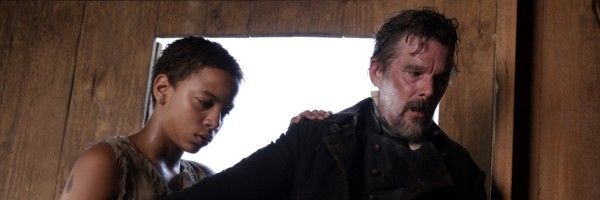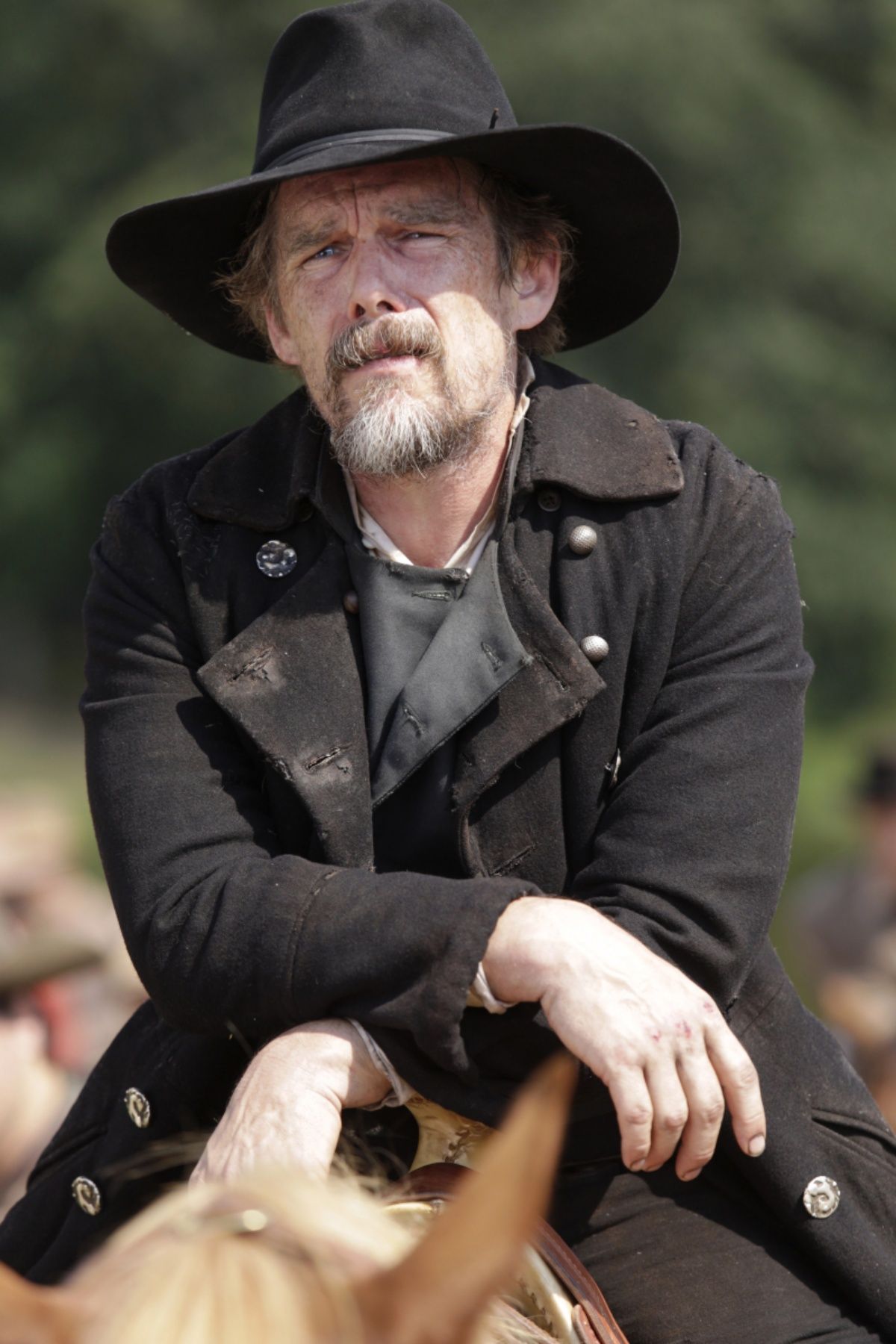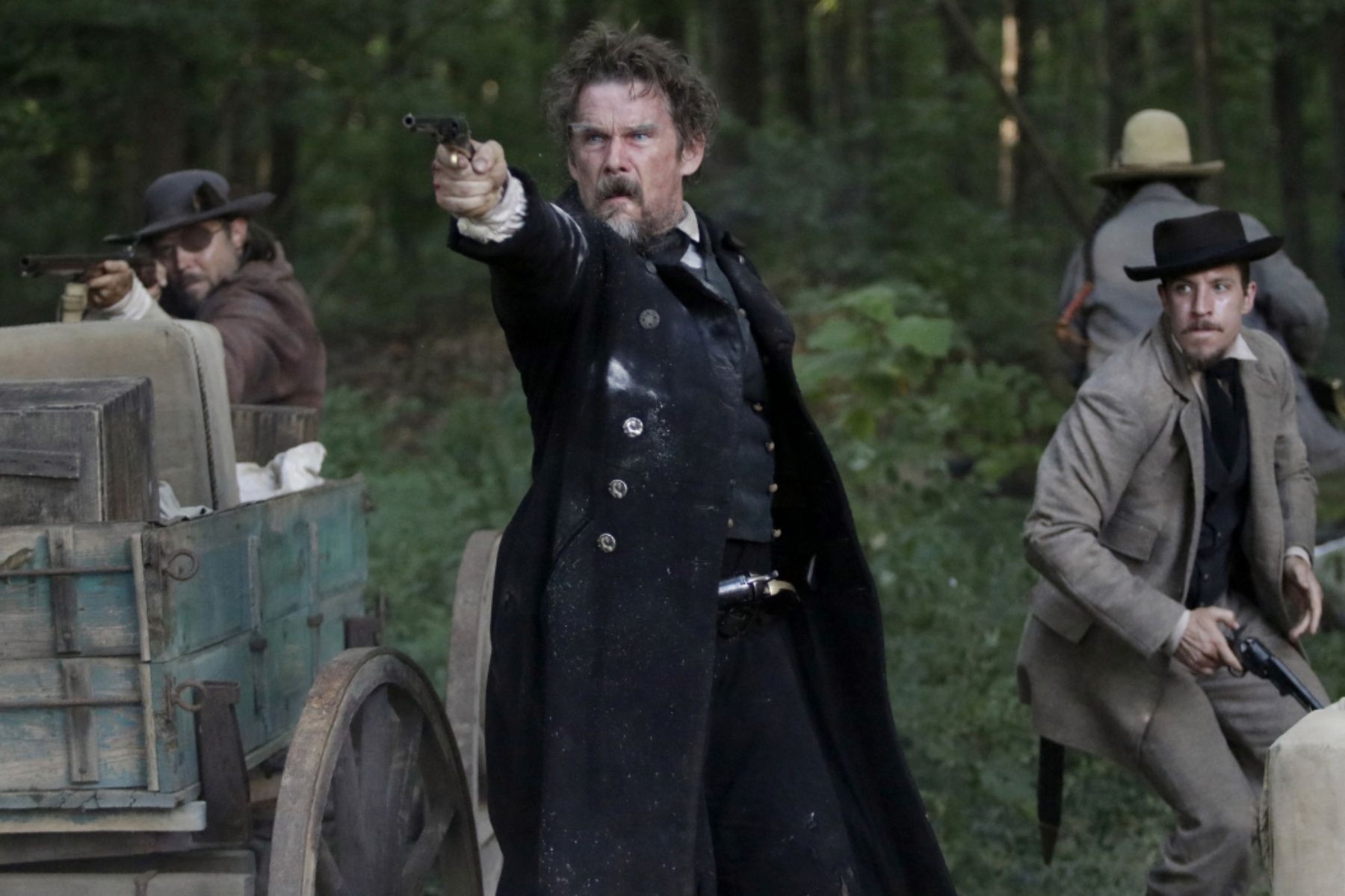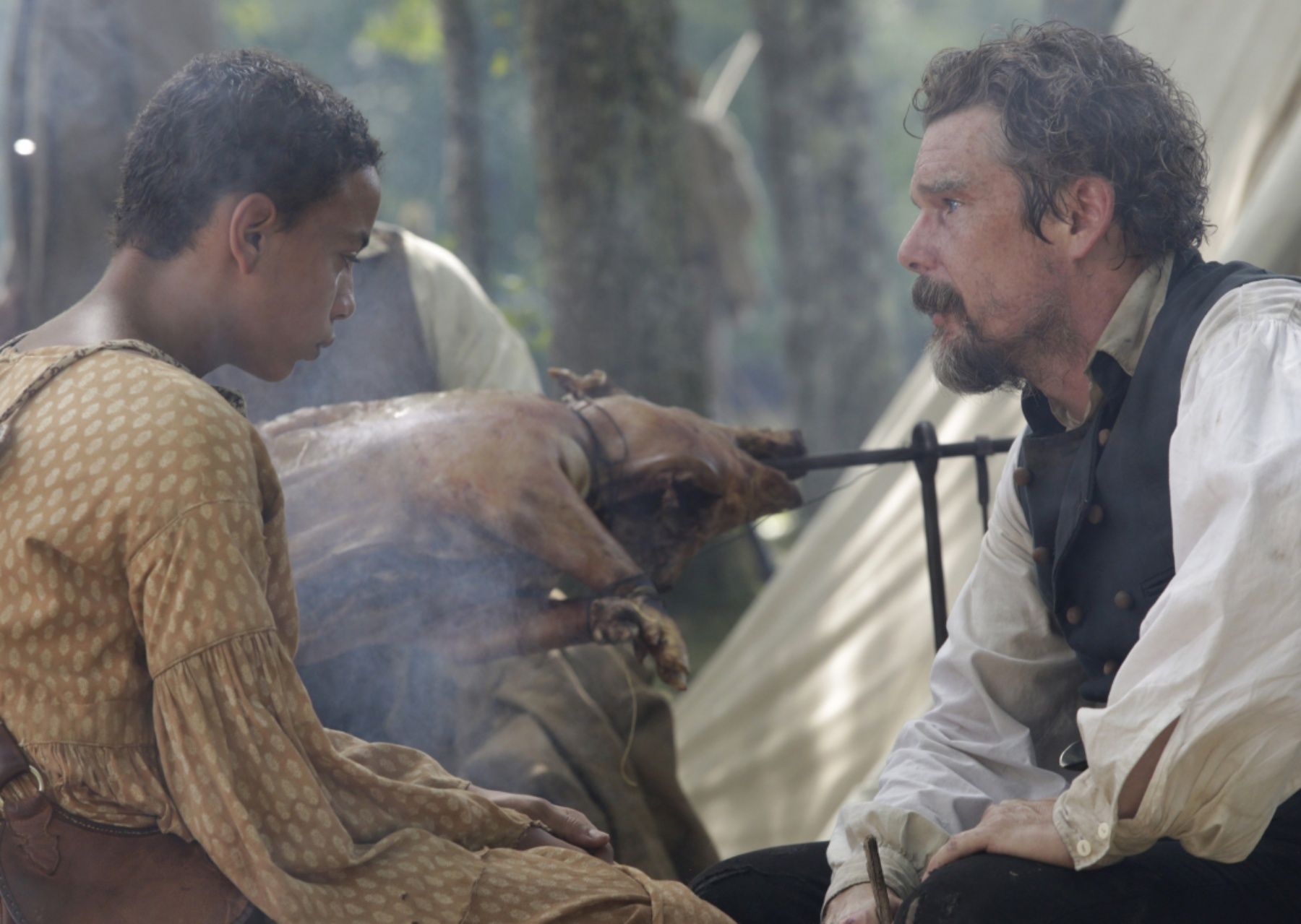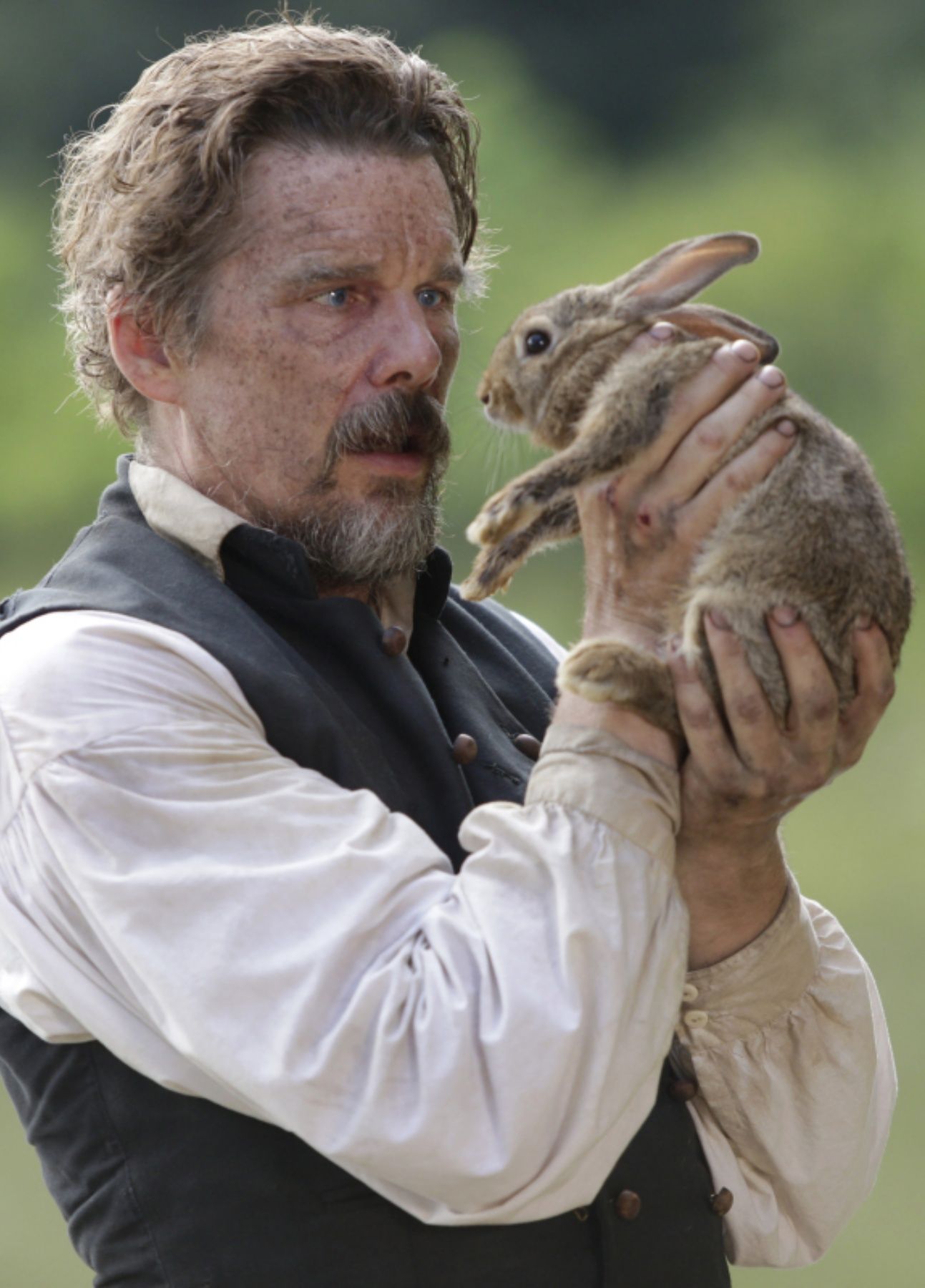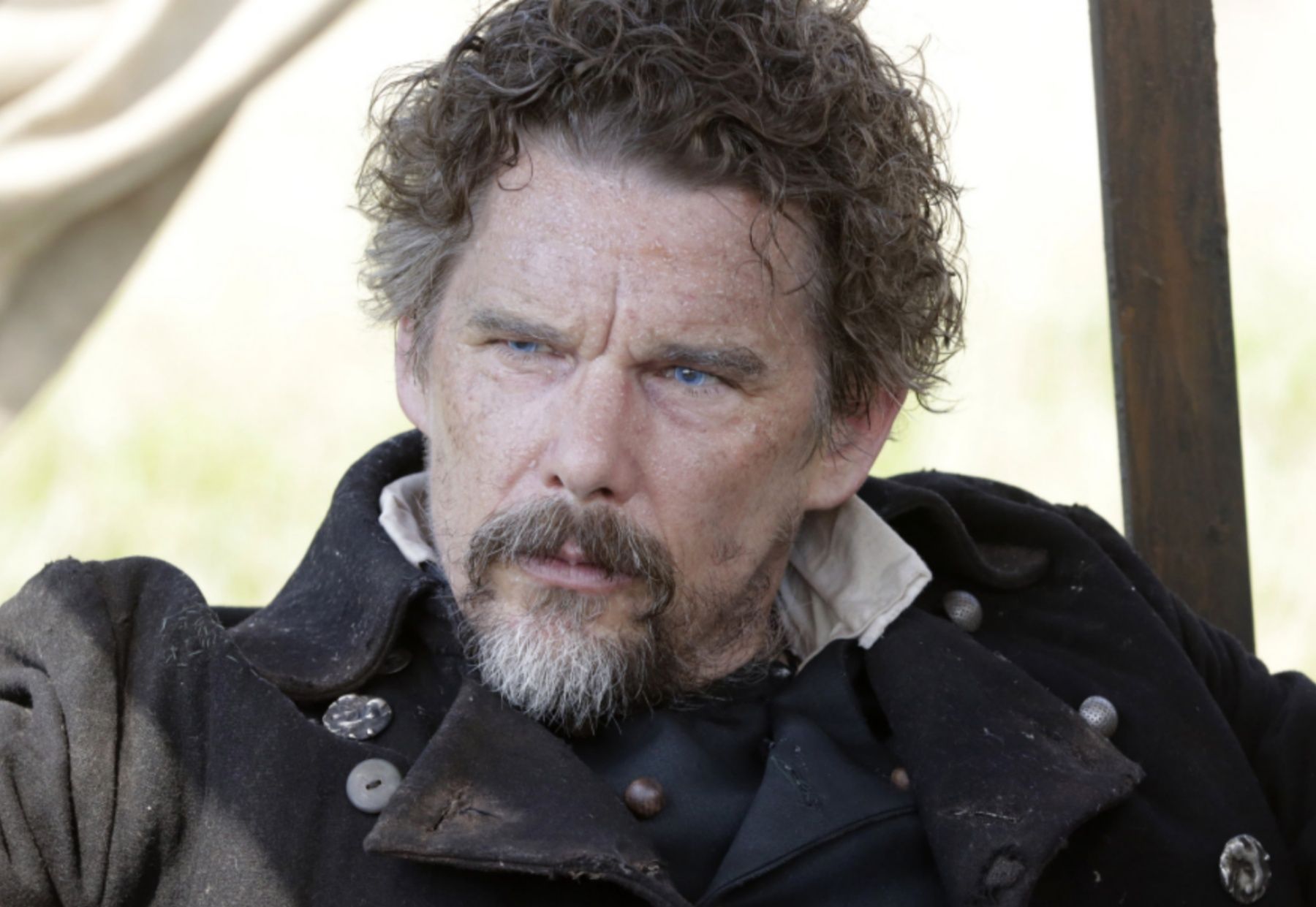From Blumhouse Television and based on the award-winning novel by best-selling author James McBride, the limited Showtime series The Good Lord Bird tells the story of controversial abolitionist John Brown (played by Ethan Hawke, in a truly tour-de-force performance) from the point of view of Onion (Joshua Caleb Johnson), a fictional enslaved young man who finds himself in the middle of the battle over slavery. It is a complicated, complex and surprisingly humorous story that spotlights race, religion, gender roles and American identity, in a way that will make wonder if we’ve really gotten any further on the road to equality.
During this 1-on-1 phone interview with Collider, Ethan Hawke, who is also an executive producer on the series, talked about what most interested him in the story told in The Good Lord Bird, when he realized that he could play John Brown, why the hero journey belongs to Onion, what he learned from working with Joshua Caleb Johnson, what makes this the toughest project he’s ever done, and whether there’s another real-life person that he’d like to play. He also talked about whether Training Day would be made differently today, the possibility of doing a new Before entry with Richard Linklater and Julie Delpy, and whether he’d be game for guest starring on Stranger Things, alongside his daughter Maya Hawke.
Collider: You’re absolutely fantastic in this. When you picked up this book and were reading it, what was the moment that you realized this story and this man had really gotten his hooks into you and that you were going to end up playing him?
ETHAN HAWKE: You know, it happened really slowly. First off, I read the book and I just kept laughing, and my wife would say, “What are you laughing about?” I said, “The Good Lord Bird.” And she said, “Isn’t that about John Brown?” And I was like, “Yeah.” And she was like, “How could that possibly be funny?” I was like, “I don’t know but you have to read it.” And so, when I first started thinking about it, it really was simply from the fact that I love the story. I imagined Jeff Bridges playing John Brown. And then, slowly, I realized how old I am. The life of an actor is really strange. The way you cast yourself, one day, is very different. You have to keep evolving and keep changing. I started realizing that I could play this part. I played Macbeth a little while ago. When you get to play really complex human beings, full of multi-motives and who are multi-dimensional, it’s very exciting. When I started realizing that I was old enough, I got really passionate about it but my feet were faster than my head. I don’t think I really thought about how to play the character until weeks before we started shooting. I’ve been developing this for years, but then I was like, “Oh, I have to act in this. What does he sound like? What does he walk like?” And then, I pressed panic and I just went for it.
This is definitely less a hero’s journey and more the story of this extremely complicated man with many layers. Does that make the story challenging to tell, or is that the fun in telling a story like this?
HAWKE: Yeah, for sure. What makes it work for me is the fact that the hero’s journey is Onion’s journey. It’s really Onion’s character that evolves and changes through the show. In a lot of ways, John Brown is the lightning rod. He’s the noise of the show. But the hero journey is Onion. John Brown has a mission and he’s on it. From the time we meet him until the time he walks the gallows, he knows what he wants to do. That’s what made it possible for me. It was the humor and the fact that I didn’t have to worry about whether John Brown was likable or unlikable. Onion is who the audience is following, and it let me play. It’s not dissimilar, in a strange way, to the structure of Training Day. The story of Training Day is really Jake’s story but Alonzo is the event.
Training Day is certainly a movie that feels even more relevant now than when it came out. Do you think Training Day would be made differently, if it were made now?
HAWKE: Maybe. One of the things that’s sad about that question is that people were talking about police brutality when we were doing Training Day. There were terrible atrocities of police brutality and abuse of power. That was a lot of what drove (director) Antoine Fuqua to make that film. I did Brooklyn’s Finest, as well, and I remember Sean Bell was shot in the week before we started shooting. That was a terrible situation, all too similar to Breonna Taylor. People keep asking me about how timely this show is, but unfortunately, this conversation has been timely for generations. I can’t wait for it not to be timely.
This story kicks off in such a strange way. You have this eccentric white man snatching this young black kid, who he thinks is a girl and puts him in a dress. What did you enjoy about playing that dynamic and working with Joshua Caleb Johnson?
HAWKE: This is where (writer) James McBride is doing something deep about identity. On one level, John Brown wants to free everyone from bondage but on another level, he doesn’t even look at this young man enough to notice he’s a man. All the white people in the it just look at the dress and the color. They don’t even see him. And every black character says, “Why you got a dress on?” McBride is trying to say something about identity and he’s also trying to knock you off balance from thinking the show is just about race. He makes the conversation also about gender, and by doing that, you realize it’s a much larger conversation that has to do with, what does it mean to be a human being, for us to see one another and hear one another? And Onion just sees John Brown as an old white guy. He doesn’t see him as a human being. He just sees him as a white guy who yells at him. The story makes us both see each other as human beings.
You seem like an actor who learns from the actors that he works with. What did you learn from working with Joshua Caleb Johnson, throughout this whole process?
HAWKE: That’s a really interesting question because there’s a mistaken notion in American arts about mentorship and this idea that the older person is mentoring the younger person, when in fact, the real value of older people and younger people working together is that we help each other. I have a lot of experience that I can, if he’s willing to listen, use to help Joshua. But Joshua has a fire, an innocence, a purity of heart and an intention, that if matched with intelligence, which he also has, and if matched with humility and confidence, both, I did learn a lot from him. I loved how excited he was to go to set, every day. He was always on time and he was always so excited, when he wrapped, for what we were gonna do tomorrow. He was so excited about where his character was going and about the next dress his character was gonna get to wear. He’d say, “I can’t wait to wear the red dress.” There’s something contagious about that purity of intention.
One of the things that really struck me with The Good Lord Bird is the amount of dialogue that you deliver. What was it like to deliver this dialogue, throughout the shoot?
HAWKE: That’s the challenge of my profession. You should talk to that guy who drove me to work every day. I had so many lines and I used to run them in the car and try them on. I had a great sadness when this part was over because it was so challenging, in every aspect, from his spiritual life to is to the specifics of delivery, vocally what it sounds like, what he walks like, and how he rides a horse. It was so infinitely interesting. It’s hard to have a character this complex.
What do you think a man like John Brown could teach people today?
HAWKE: Well, the most obvious is what white allyship looks like. It looks like putting yourself front and center and standing up for anybody who’s being mistreated and who’s being treated in a way that you wouldn’t want your children treated, and who doesn’t have a chance, the way you would want your children to have a chance, and doing something about that. It’s about not letting greed and fear have too loud of a voice in your head and not giving them the steering wheel of your car.
You’ve talked about how this was one of the hardest things you’ve done. What was the absolute hardest day on this shoot?
HAWKE: There were so many, in a lot of ways. My brain jumped to the first day because it was 107 and it was the opening scene. I was in this local tavern and I had on this giant jacket and all of these wool clothes, it was 107, and I was hiding a shotgun under my jacket. Not only was I playing John Brown but I was playing John Brown who’s trying to hide himself by pretending to be Irish. So, I had to do John Brown doing an Irish brogue, so that he doesn’t get recognized. And then, I had to start quoting the Bible, and getting in a fight and shooting guns. I had this thought about three quarters of the way through the day that was, “Oh, this is what having a heart attack feels like. I am a hair’s breath from having a full blown heart attack.” There were other days that weren’t fun. We were filming on the anniversary of the first slave ships arriving in Virginia in 1619, and we were filming a slave insurrection that day and asking black folks and white folks to re-enact some horrible situations that are very painful to re-enact. If you have to wear those clothes and you have to hold a whip, or you have to look at a gallows being built, it’s very, very upsetting for everyone. We had wonderful people and we all bought into the idea that telling this story might help heal and that it was worth it. We certainly know not telling the story hasn’t helped. So, there were hard days, in different ways.
You’ve played a few historical figures lately, from John Brown to Tesla. Is there another real life person that you’d love to play, if given the opportunity?
HAWKE: My brain doesn’t really think like that. I’ll know it when I see it. I’ve been trying to develop a movie about a couple of country singers, called The Louvin Brothers. They were contemporaries of Hank Williams, and I would like to do that. I wanna get that movie off the ground. But I think in terms of stories. I never really thought of myself as playing the John Brown. I thought of myself as playing James McBride’s John Brown. I played Michael Almereyda’s Tesla. I didn’t play Nikola Tesla.
Do you feel like you had a turning point in your career where you went from being an actor who was playing characters to really playing with and pushing the boundaries of what you could do, artistically?
HAWKE: It came from my experience in the theater, you know. Talking about mentorship, I did Henry IV with Kevin Kline and when you watch him play Falstaff, you realize that there’s just very few people that can do that as well as he can, with his ability to use comedy and drama, his voice and speech, body language. There’s a trap in my profession that you can think of it like your job is to be a celebrity. That’s a giant trap and a giant distraction. If your job as being an actor, it becomes infinitely interesting. One of my favorite actors, Richard Easton, used to say, “One lifetime is not enough.” Studying human psychologies, it’s this deep, deep well that touches so much. One lifetime is not enough.
Have you talked to Richard Linklater about a new Before entry, so that maybe fans could see whether that marriage has survived?
HAWKE: There’s something about the pandemic that made it more interesting to us. I feel like I have a parallel life with Jesse and Celine. I’ve been talking to Richard, all throughout this, and I’ve been talking to Julie [Delpy]. We haven’t talked about another movie, in specifics, but we talk. The magic for us, of those two sequels, was that we all felt we had something that we really wanted to write together. We really had something to say, and it was the same thing. We all wanted the same thing. We just have a constant little ongoing dialogue about how each other are feeling. Julie and I are turning 50 this year, so that’s pretty interesting. There’s a lot there.
Would you ever guest star on Stranger Things?
HAWKE: Oh, heck, yeah! Wouldn’t that be great? Maya should have to meet her father. They could come up with some crazy character for me to play. That is so my wheelhouse. I was those kids’ age when that show is set. It’s so funny for me that Maya is playing a character like that. I went to those malls. I worked at an ice cream shop in 1988, or whenever it’s set.
The Good Lord Bird airs on Sunday nights on Showtime.
Christina Radish is a Senior Reporter of Film, TV, and Theme Parks for Collider. You can follow her on Twitter @ChristinaRadish.

